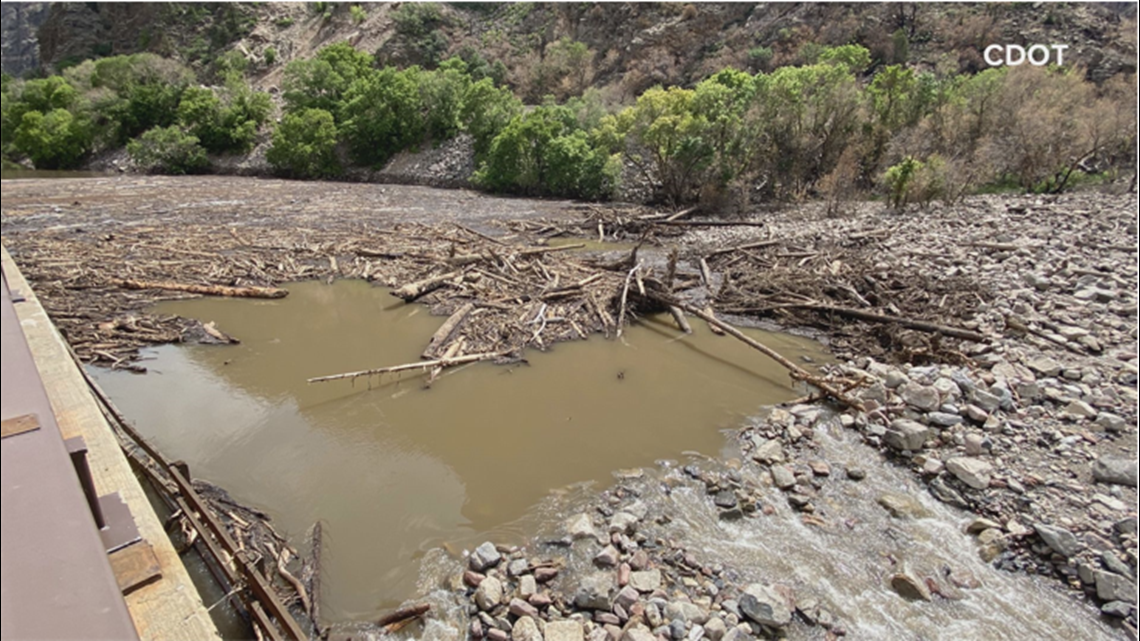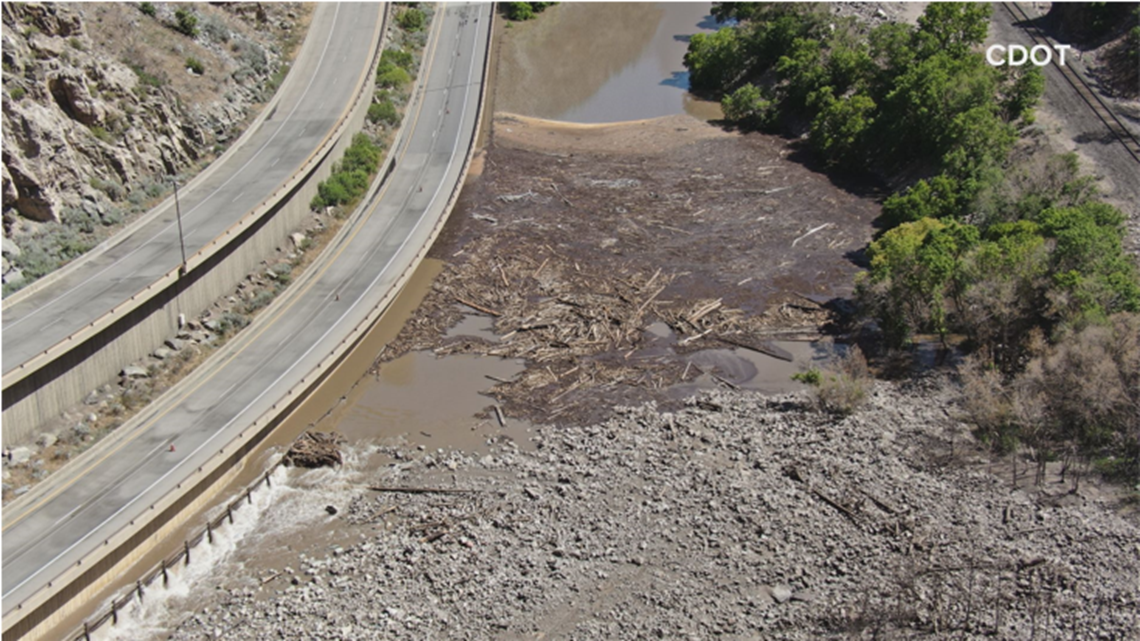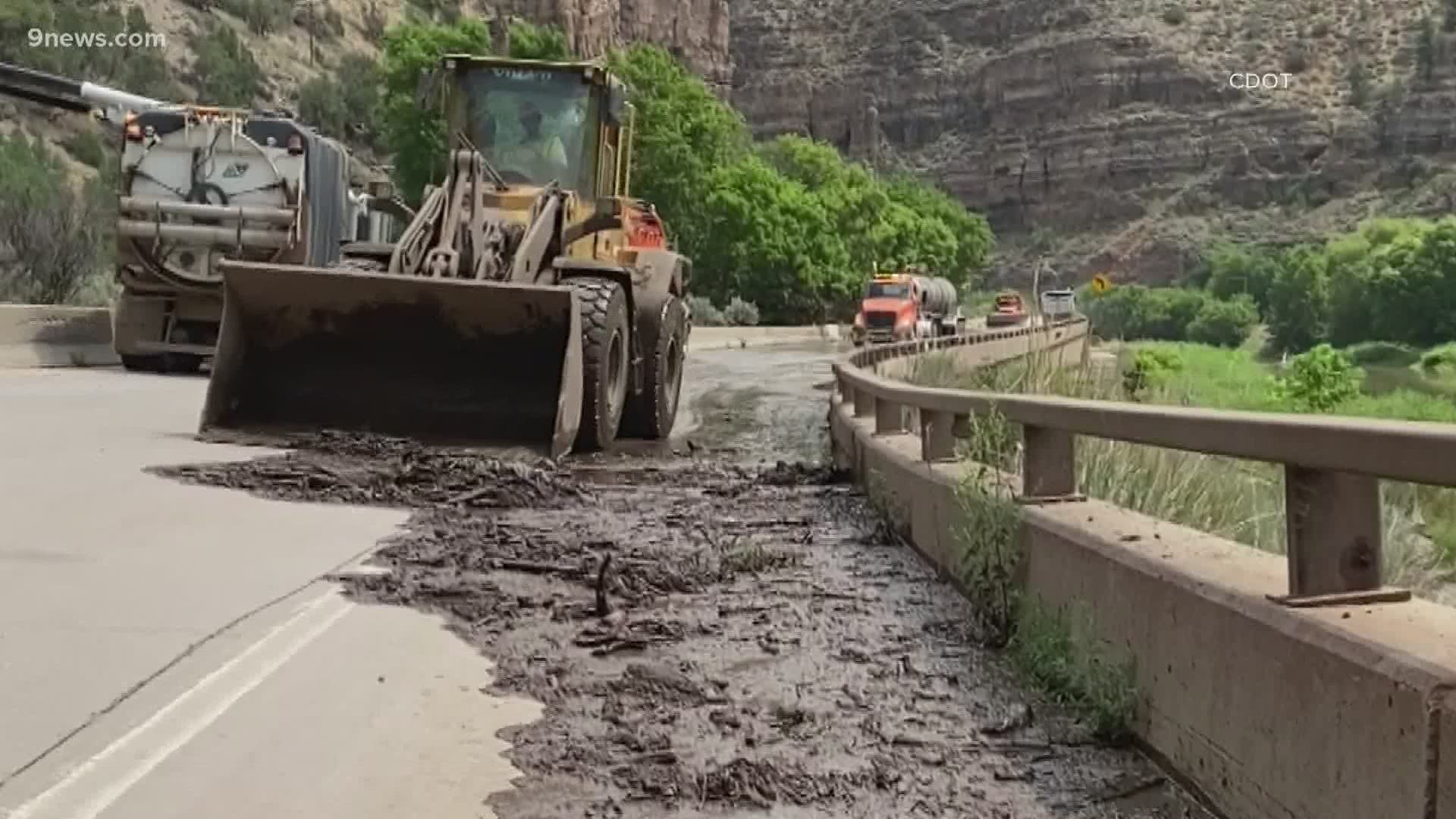GLENWOOD SPRINGS, Colo. — Heavy rains have recently caused off-and-on closures on Interstate 70 in Glenwood Canyon as debris tumbled down to the road and into the Colorado River.
The closures themselves continue; meanwhile, the Colorado Department of Transportation (CDOT) and other agencies are working on a plan to remove debris from the river itself.
A CDOT spokesperson helping with the Glenwood Canyon response, Tracy Trulove, said that they've been working with Union Pacific Railroad to be able to haul equipment on the south side of the canyon, where the major debris flow is blocking the river.
"Working with several of our geo-hazards, hydrologists, we're trying to figure out where we can cut a channel to try to get the natural flow of the river back to where it is and keep it and move it away from where it's up against the bike path and the highway structure," Trulove said.
The interstate in Glenwood Canyon was re-opened for just a few hours Saturday before it was closed again as a precaution due to weather, to open again a few hours later.
Trulove said on Saturday afternoon that the delivery of the flatbed railroad car and some of the needed equipment is expected on Monday night or Tuesday morning.
"We're building out a plan because there is a lot of rock in there," Trulove said. "There's a lot of logs that are kind of behind that rock. And the last thing we want to do is go in and start excavating and then just send a bunch of debris down the river. So there's clearly decisions being made about how to do this as safe as possible for people and not put a lot more obstacles in the river."


Obstacle after obstacle
Trulove said the debris has prevented crews from assessing the true impact of the mudslide, but they recognize the overall impact elsewhere.
"It's a tremendous impact on people in that main artery through Colorado," she said. "We recognize it's an impact on motorists. It's an impact on commerce."
She also said that clearing the debris could be slowed or even reversed due to the constant rain.
"A lot of this material is really, you know, lots of water, mud, and it's filling up drains and things in the canyon," she said. "... We have vacuum trucks in there, trying to get the drains cleaned out, and then it'll just fill back up with water. So a lot of it has been as soon as they make some progress. We're still dealing with a tremendous amount of precipitation, the moisture clogging drains. And those are all things we need to get cleared out in the event we have another ... debris flow occur."
If they cut a new channel back more toward the middle of the river, Trulove said, it's going to allow crews to go in and see what kind of damage has occurred to the bike path and the highway infrastructure.
"We've got to be able to get in there and see what's going on," she said.
She adds that in some cases, the debris that is taken away in trucks can be stored and used as "riprap," which is a sort of loose rock that can be used to form material to help prevent erosion, which can be used for other CDOT projects in the future.


The impact on the river
The fact that there is debris in the water is nothing new for crews to handle, but it is a more significant-than-usual event with the amount of debris in the river.
"Previously, we've had quite a few other smaller slides that came from the other side on the north," said Dave Kanzer, director of Science and Interstate Matters for the Colorado River District. "But really their primary impact was on I-70. And so this one was much more solid material, rock cobble trees. And for the first time now we're seeing directly in the river."
Kanzer added that some of the impacts include water quality.
"The quality gets temporarily impacted, and that means more mud, of course, turbidity, specific conductivity, brief changes in PH and even temperature," he said, adding that there are quite a few municipalities that utilize the Colorado River for their drinking water. "To be able to understand the materials that are coming down, being able to turn off their intakes for a short period of time or switch over to a separate water supply that's not impacted is critically important."
He said they've worked with agencies like CDOT, the Colorado Division of Water Resources and the U.S. Geological Survey to put together an early warning system so people downstream know about potential impacts on the water.
"We also have quite a bit of recreation in the river," he said. "And so what I'm talking about are rafters, kayakers. We also have a whitewater park. And we don't want those folks to be unaware of some of this material coming down."
He said that in terms of moving the material out, there isn't a great rush because they want to do it carefully and methodically.
"Unfortunately, what that means is probably delays for travelers. We're going to need a lot of patience for folks to understand that this is very important infrastructure and important, of course, water supply for hundreds of thousands, if not millions of people," he said.
Overall, there are a few takeaways from the incident.
"One thing is to be prepared," he said. "We were able to get quite a bit of increased monitoring, not only in the river, but around the rim of the canyon, in the burn scar. By that, I mean we've deployed five additional real time precipitation monitors. We're working closely with the weather service. And so the lessons, again, are these things can and will happen. We need to be prepared and have backup plans and have excellent communication."
Downstream is a large plant operated by Xcel Energy. In a statement, a spokesperson said:
“Our hydroelectric plant was not damaged by the recent landslide in Glenwood Canyon, near where the Grizzly Creek Fire occurred last year. Debris from the landslide created a dam in the Colorado River near our Shoshone Hydro plant, which continues to operate. We are working with the Colorado Department of Transportation or CDOT and other state and local agencies to do what we can help.”
RELATED: U.S. Forest Service employee rescued by helicopter following debris pileup in burn scar area
SUGGESTED VIDEOS: Latest from 9NEWS

